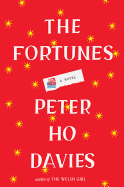
The protagonists in Peter Ho Davies's The Fortunes are both bystanders and symbols, forced by circumstance of their ethnicity to become footnotes in history; ironically, by being footnotes they also come to represent the Chinese American experience as a whole. Davies takes these disparate, sometimes desperate, people and weaves them into a meditation on identity, how one's self-image battles with the presumptions of the world. It's a powerful novel that unflinchingly examines both the degrading lives of immigrants in the 1800s and the identity crises of modern mixed-race families. Throughout it all, Davies remains sympathetic to his heroes--although they have been all but lost in the flow of history, a deft hand can still pull them into prominence.
Separated into four sections, the book begins with Ling, manservant to the Transcontinental Railroad's owner, who was born in China but sold into indentured servitude in America. He inadvertently instigates the railway's hiring of Chinese workers, and is present when they strike for the same pay as their white counterparts. But The Fortunes never zooms out, instead continuing with Ling as he grapples with what it means to work for a man who treats his countrymen so callously. The history comes out in the specifics, as Davies fleshes out the larger struggle Chinese workers faced against racism, aggression and the sheer danger of the work. Although Ling was a real person, little is known about him, so Davies's rendering is almost entirely fictitious. Throughout The Fortunes, Davies plays with the line between historical narrative and personal, between the fictions we tell the world and those we tell ourselves.
Flirting with truth and fiction is more pronounced in the subsequent sections. Davies turns to Anna May Wong, the earliest Chinese American movie star, as she travels to China for the first time. Anna May's story shows the crippling sexism, ignorance and, of course, racism that pervaded Hollywood. Unlike Ling, who becomes a symbol for his countrymen inadvertently, Anna May fights for the spotlight. She's well aware of the mantle she takes on as a starlet, even as it begins to crush her. Her trip to China, a country she's never seen, only underscores her precarious position as both symbol and person. Late in her career, she was passed up for a role in the movie The Good Earth for being "too Chinese," a plight that runs through her portion of The Fortunes. Davies is adroit in his portrayal, showing how whites define the rules of engagement when it comes to race. Born in America but somehow too Chinese, Anna May never manages to find a middle ground that works.
The Fortunes takes its discussion of symbol one step further with the murder of Vincent Chin, and the organizing among Asian Americans that came in its wake. Beaten to death by two white men, Detroit-born Vincent Chin becomes a martyr for the cause of Asian American equality. Vincent himself turns out to be a bit of a jerk, but Davies probes the middle ground between who he actually was and the personification of racism he turned into after his death. The narrator of this section, a friend of his and witness to the murder, struggles with the discrepancy between Vincent the man and Vincent the rallying cry. As with all parts of the book, Davies is less interested in Chin himself, focusing instead on how Chin became something more after his death, when members of the Chinese American community joined up with other groups to demand that his murder be considered a hate crime (thereby expanding the notion of hate crime).
These various threads of history come together in the final part, where John Smith, a mixed-race academic who bears more than a few similarities to Davies himself, travels with his wife to China to adopt a baby. In a sense, everything becomes reversed: a man born of Chinese migration comes back to the source of that migration in order to continue it. The irony is not lost on Smith, who is constantly mistaken as some sort of arbiter of Chinese culture by his fellow prospective adoptive parents.
Smith is aware of Ling, Anna May and Vincent. Indeed, he plans to write a book about them. But he has yet to settle on his own identity, both other and American (which of course is other in China), forced to take on the role of expert when in fact he knows less about China than some of the other travelers. He is obliged to be more than a tourist, much like Anna May in her visit "home."
It would be a failure if Davies ended this fourth section with any real conclusions. His point is not really to make a point at all, but to portray the haziness of identity as larger forces of culture, technology and capital constantly thrust new personas on all of us, Chinese American or not. The brilliance of The Fortunes is not that it expertly dissects Chinese American-ness--or American-ness, for that matter. Davies has conjured a book that forces its readers to find the pressures they face in their own lives, to see how the struggle of self-identity and one's place in the world is alive in each and every one of us. --Noah Cruickshank

